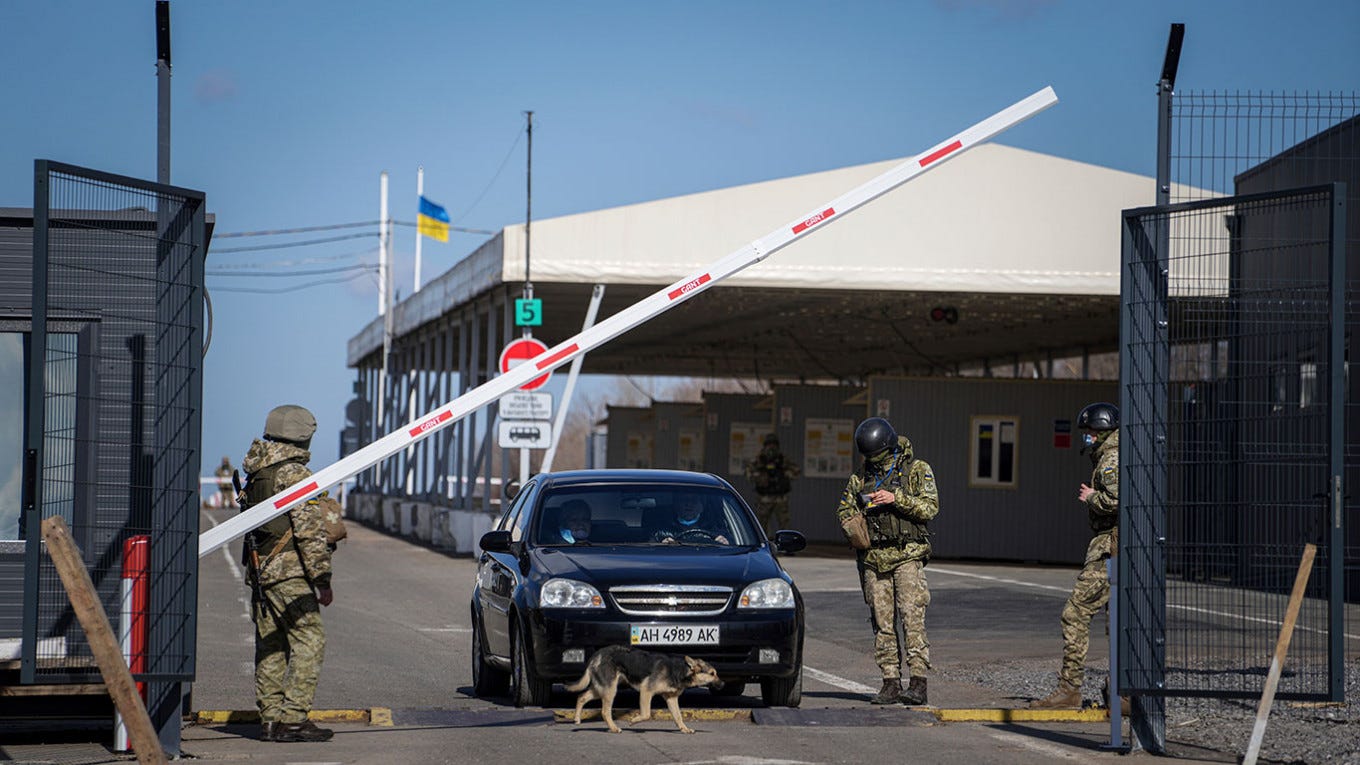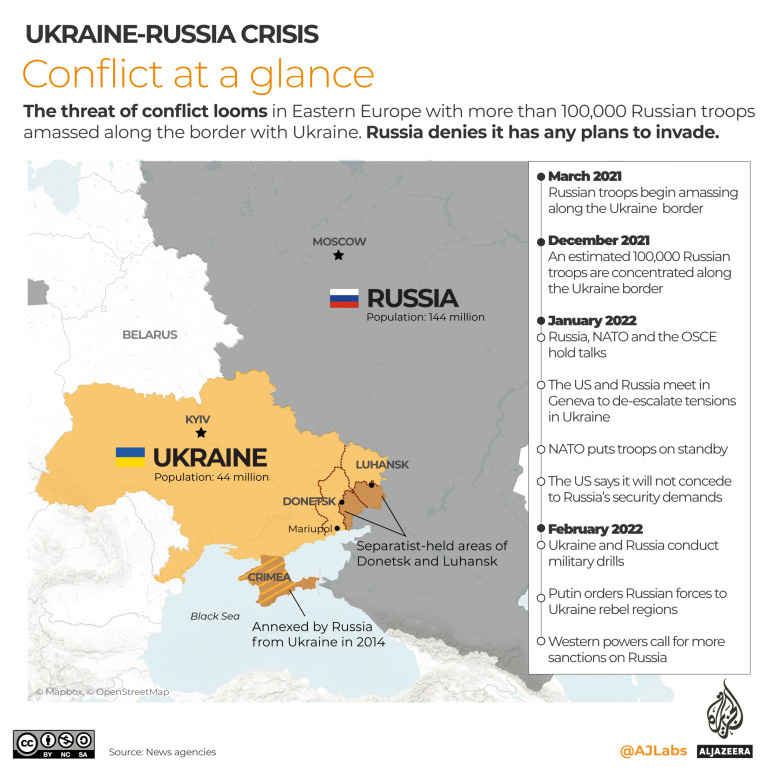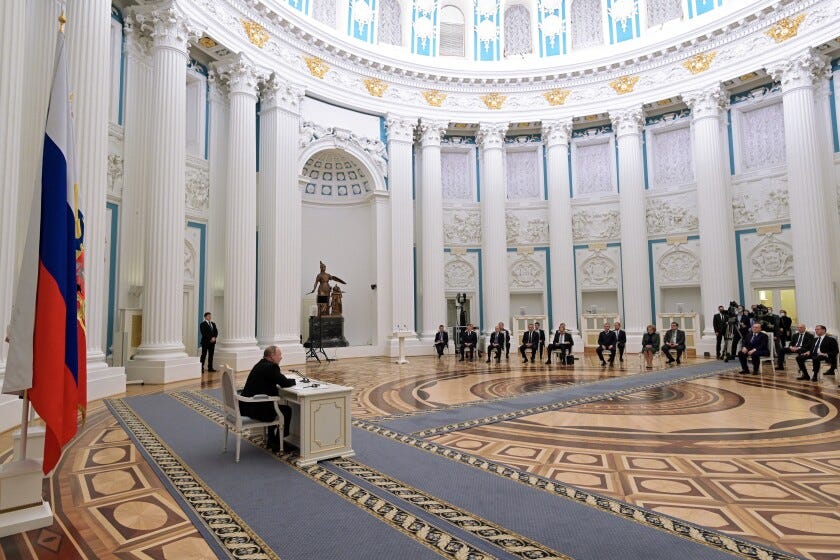Ukraine Crisis Escalates
How the world reacted to the Russian recognition of the breakaway territories of Ukraine ?
The fear of a Russian invasion to Ukraine has become real. Putin after an angry and emotional address to the nation lectured the world about Ukrainian history. He not only recognised the rebel-held territories in the Donbas region but also ordered Russian troops to march in the region as peacekeepers.
The last 24 hours have been extremely crucial from a geopolitical perspective as the last week’s hope for de-escalation are now officially gone. Here is a look at how the crisis unfolded in the last 24 hours and how the world reacted to it.
Putin’s lengthy address to the nation
“I believe it is necessary to take a long-overdue decision, to immediately recognise the independence and sovereignty of the Donetsk People's Republic and the Lugansk People's Republic," said Putin in an address to nation. Putin’s signing the mutual aid and friendship agreement with the leaders of these breakaway regions was then live broadcasted on state-run television network. “Russia's parliament approved treaties with the two regions in Ukraine's east, a day after Putin said he was recognising the independence of the two enclaves, which adjoin Russia and have been controlled by Russian-backed fighters since 2014” reported the Reuters. The Parliament also approved the President’s request to deploy Russian troops on foreign lands. The Russian troops entered the Donbas region as Peacekeepers.
Shelling resumed on the line of contact between government and separatist forces in eastern Ukraine on Tuesday morning, Reuters claimed quoting a diplomatic source.
A car waits to cross a checkpoint from territory controlled by Russia-backed separatists to the territory controlled by Ukrainian forces in Novotroitske, eastern Ukraine.Evgeniy Maloletka / AP / TASS
Ukrainian reaction to the development?
Comedian turned President Volodymyr Zelensky demanded tough sanctions and an immediate halt on the Nord Stream 2 Project. He further informed about the ongoing discussions on severing diplomatic ties with Russia. Ukraninan Defence Minister warned of long hardships and losses. We will have to endure pain, overcome fear and despair," Oleksiy Reznikov said in an address to Ukraine's armed forces posted on his ministry's website.
Zelensky warned that Russia's recognition of his country's two breakaway regions was a precursor for a further military assault. "We believe that with this decision, Russia is creating the legal basis for further military aggression against Ukraine, thus violating all possible international obligations," Zelensky said.
How the World Reacted ?
United Nations
The United Nations Security Council convened an emergency session, during which the United States and its allies criticised Russia’s moves. They said the order for deployment of troops in eastern Ukraine was "pretext for war” and violation of international law, news agency AFP reported.
Russia’s UN ambassador, Vassily Nebenzia, said the US and its Western allies were egging on Ukraine toward “an armed provocation”. He accused Ukraine of sharply increasing shelling in residential areas of the separatist regions over the past weekend and in some Russian towns and villages near the border.
Sergiy Kyslytsya, Ukraine’s UN ambassador, demanded that Moscow cancel its recognition, immediately withdraw “occupation troops” sent there, and return to negotiations. Kyslytsya condemned Putin’s “illegal and illegitimate” decision.
India
India, at the UN session, expressed deep concern about the escalation of tensions along the Russia-Ukraine border. “The immediate priority is de-escalation of tensions taking into account the legitimate security interests of all countries and aimed towards securing long term peace and stability in the region and beyond,” said TS Tirumurti, India’s ambassador to the UN.
China
China, a Russia ally, said it was concerned while Japan said it was ready to join international sanctions on Moscow in the event of a full-scale invasion.
Australia
Australian Prime Minister Scott Morrison said Russia should “unconditionally withdraw” from Ukrainian territory and stop threatening its neighbours.
Syria
Breaking away from the chorus of condemnation, Syria’s government said it “supports” Putin’s move and “will cooperate” with the two separatist regions.
Kenya’s ambassador to the UN Martin Kimani condemned Russia’s move, saying that “multilateralism lies on its deathbed tonight”. A video of his speech has been widely shared – and lauded – on social media.
Turkey
President Recepe Tayyip Erdogan slammed the recognition as unacceptable.
Italy
Prime Minister Mario Draghi warned of EU sanctions.
Serbia
Serbian President Aleksandar Vucic said that there are fears that the Ukraine crisis "could spread in other parts of Europe and the world, especially on the Western Balkans".
Japan
Japan's Prime Minister Fumio Kishida said Russia's actions "cannot be tolerated".
"If an invasion occurs, we will coordinate a strong response, including sanctions, coordinating with the G7 and the international community while closely monitoring the situation," he said.
How the Allies reacted?
Western powers reacted swiftly to Monday's decision by Russian President Vladimir Putin to recognise the independence of the two self-proclaimed republics in eastern Ukraine, condemning Moscow and calling for sanctions.
The leaders of France, Germany and the United States condemn Putin's move as a "clear breach" of the Minsk peace agreements.
French President Emmanuel Macron, German Chancellor Olaf Scholz and US President Joe Biden agree that "this step will not go unanswered". Macron called for targeted EU sanctions against Russia and also called for an emergency meeting of the UN Security Council.
UK Prime Minister Boris Johnson denounced Putin's decision as "a flagrant violation of the sovereignty and integrity of the Ukraine". A "very robust package of sanctions" would be triggered "with the first toecap of a Russian incursion or Russian invasion", he further added. Boris Johnson vowed to immediately impose hard economic sanctions on Russia. The sanctions, he said, would be "targeted not just at entities in Donbas and Luhansk and Donetsk, but in Russia itself - targeting Russian economic interests as hard as we can.Britain has also targeted Russian banks through sanctions.
Germany has put the Nord Stream 2 project on hold. The step was widely seen as one of the strongest measures Europe could take. German Chancellor Scholz said he had asked his economy ministry to take steps to ensure that certification could not take place for now. "This is a morally, politically and practically correct step in the current circumstances," Ukrainian Foreign Minister Dmytro Kuleba tweeted. "True leadership means tough decisions in difficult times. Germany's move proves just that." Russia regretted Germany’s move and hoped that the delay in recognition of the pipeline was temporary. Reacting to the halt Kremlin said that it will continue unhindered energy supply to the world.
U.S. President Joe Biden signed an executive order to halt U.S. business activity in the breakaway regions. US Ambassador Linda Thomas-Greenfield heaped scorn on Putin's assertion that the Russian troops would take on a "peacekeeping" role. "This is nonsense. We know what they really are," she says. The US envoy said that an earlier speech by Putin amounts to a "series of outrageous, false claims" that were aimed at "creating a pretext for war". Joe Biden addressed his people on the crisis.
Russian President interacts with the members of his government.
The European Union
The EU agreed on new sanctions that targeted to blacklist more politicians, lawmakers and Russian officials. It sanctions also banned EU investors from trading in Russian state bonds, and targeted imports and exports with separatist entities. A totle of 27 individuals and entities have been targeted. The EU foreign ministers, however, did not choose to sanction Putin.
"This package of sanctions that has been approved by unanimity by the member states will hurt Russia, and it will hurt a lot," said EU's foreign policy chief Josep Borrell.
“The package of sanctions includes all members of the lower house of the Russian parliament who voted in favour of the recognition of the breakaway regions, freezing any assets they have in the EU and banning them from travelling to the bloc”, reported Reuters.
It was not immediately clear when the sanctions would take effect, but diplomats expect them in the coming hours or days when names and details will be made public.
NATO
Jens Stoltenberg, the NATO Seceretary General condemned Russia’s decision to extend recognition to the self-proclaimed “Donetsk People’s Republic” and “Luhansk People’s Republic”. “This further undermines Ukraine’s sovereignty and territorial integrity, erodes efforts towards a resolution of the conflict, and violates the Minsk Agreements, to which Russia is a party”, said Stoltenberg.
The NATO-Ukraine Commission met in Brussels on Tuesday (22 February 2022) for an extraordinary meeting to address the security situation in and around Ukraine.
Allies condemned Russia’s decision to recognise the self-proclaimed Donetsk and Luhansk People’s Republics, as well as Russia’s further incursion into Ukraine. Calling this a “serious escalation by Russia,” NATO Secretary Jens Stoltenberg said Moscow had moved from covert attempts to destabilise Ukraine to overt military action, with many Russian units forward deployed in combat formations and “ready to strike.”
The Secretary General commended Ukraine for its restraint in not responding to Russia’s repeated provocations. “We stand in solidarity with the Ukrainian people and its government,” he said. Mr Stoltenberg stressed that Allies are united in their full support for Ukraine’s sovereignty and territorial integrity within its internationally recognised borders, and continue to provide strong political support and military equipment to Ukraine.
The Secretary General underlined that NATO will do whatever is necessary to shield Allies from aggression. In the last weeks, he noted, Allies have deployed thousands of more troops to the eastern part of the Alliance and placed more on standby. “We have over 100 jets at high alert and there are more than 120 Allied ships at sea, from the High North to the Mediterranean,” he said. The Secretary General also welcomed the economic sanctions announced by many NATO Allies and the decision by the German government that it cannot certify the Nord Stream 2 pipeline. At the same time, he noted that Allies continue to urge Russia, in the strongest possible terms, to choose the path of diplomacy. Calling this “the most dangerous moment in European security for a generation,” the Secretary General said that Europe and North America continue to stand strong together in NATO, committed to defend and protect each other.
This is all for today. Keep Reading. Thanks
Kindly Subscribe and Share






